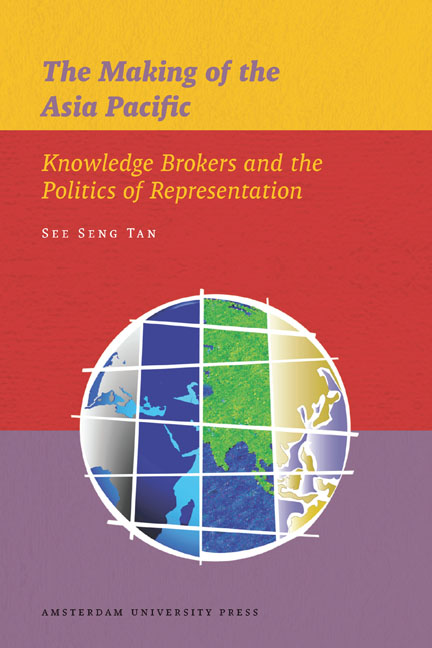Book contents
- Frontmatter
- Dedication
- Contents
- List of Tables
- Acknowledgements
- 1 Introduction: From ‘Pacific Asia’ to ‘Asia Pacific’
- 2 The Desire for Essence
- 3 Knowledge Networks as Agents of Representation
- 4 Representing the ‘Asia Pacific’
- 5 Representing Sovereign States
- 6 Representing the ‘In/Human’ Faces of Asia Pacific Security
- 7 Representing the ‘Authority’ of Knowledge Networks
- 8 Conclusion: A Plea in Three Parts
- Notes
- Bibliography
- Index
- Miscellaneous Ensmatter
2 - The Desire for Essence
Published online by Cambridge University Press: 10 December 2020
- Frontmatter
- Dedication
- Contents
- List of Tables
- Acknowledgements
- 1 Introduction: From ‘Pacific Asia’ to ‘Asia Pacific’
- 2 The Desire for Essence
- 3 Knowledge Networks as Agents of Representation
- 4 Representing the ‘Asia Pacific’
- 5 Representing Sovereign States
- 6 Representing the ‘In/Human’ Faces of Asia Pacific Security
- 7 Representing the ‘Authority’ of Knowledge Networks
- 8 Conclusion: A Plea in Three Parts
- Notes
- Bibliography
- Index
- Miscellaneous Ensmatter
Summary
The problematic essentialisms that characterise the contributions of Track 2 knowledge networks of the Asia Pacific are also to be found in constructivist writings in international relations, not least those which make the Asia Pacific (or East Asia and Southeast Asia) their foci of study. To be sure, realist/realpolitik contributions, with their insistence on assuming the unquestioned objectivity of their claims, are the most blatant and readily available expressions of essentialism in Asia Pacific security studies, and a number of excellent rejoinders from non-realist quarters have arisen in recent years (Burke & McDonald 2007). The more interesting and tricky examples of essentialism are those within the efforts of (self-professed) constructivist scholars of Asia Pacific security, whose otherwise appealing innovations on identity-based questions are, at least to my mind, stymied by a common refusal to entertain seriously the radical implications that their inquiries raise. Yet it is this same refusal that renders suspect their claim of Asia Pacific security as a social construction. More precisely, it is not their claim per se that evokes suspicion as much as their foreclosure of inquiry into their own complicity in the constitutive process – a problem involving fundamental suppositions about subjectivity as sovereign, in short. Arguably, any serious attempt at addressing this enduring problem of subjectivity, which has long informed security studies generally and Asia Pacific security studies particularly, would find better purchase in an understanding of subjectivity that is decoupled from the long-cherished supposition of sovereignty (Tan 2006). But as we shall see, most constructivists writing about the contemporary Asia Pacific implicitly share a desire for essence for which their realist and rationalist counterparts are better known.
Social constructivist accounts have been making their mark in the field of Asia Pacific security studies (Acharya 2009, 2011; Ba 2009; Haacke 2003; Johnston 2007; Katsumata 2010). So forceful has their advance been that at least one pundit has taken to describing the field, rightly or otherwise, in terms of ‘the new constructivist orthodoxy’ prevalent among many students of regional affairs (Khoo 2004: 45). This development is all the more remarkable for having taken place within an enterprise that has hitherto eschewed the application of formal theory to the analysis of regional security (Emmerson 1987).
- Type
- Chapter
- Information
- The Making of the Asia PacificKnowledge Brokers and the Politics of Representation, pp. 27 - 44Publisher: Amsterdam University PressPrint publication year: 2013



